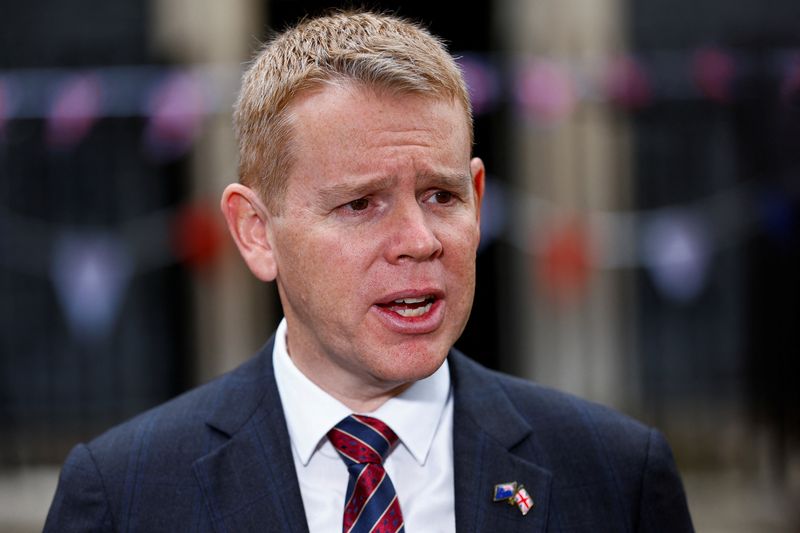New Zealand set to reveal bigger deficit in ‘no frills’ 2023-24 budget
2023.05.15 22:49

© Reuters. FILE PHOTO: New Zealand’s Prime Minister Chris Hipkins speaks to the media, after his meeting with British Prime Minister Rishi Sunak at Downing Street in London, Britain May 5, 2023. REUTERS/Peter Nicholls
By Lucy Craymer
WELLINGTON (Reuters) – New Zealand Labour government is set to reveal a worse budget bottom line and economic outlook on Thursday as it delivers what it calls a “no frills” 2023-24 budget to avoid fuelling inflation.
Since coming into power, Prime Minister Chris Hipkins has cut costly programmes and reiterated the government’s plans to return to “bread and butter issues”.
“New Zealanders are expecting us to focus on the core issues that are affecting them. They’ll see that’s what we’ve done in the budget,” Hipkins said at his weekly Monday press conference.
The country was hit by two significant weather events at the start of the year that caused an estimated NZ$9 billion and NZ$14.5 billion in damage. Roughly half that bill is expected to fall to the government to pick up.
Money will be set aside to provide some relief for those on social welfare assistance, more than NZ$1 billion has already been earmarked for rebuilding after the cyclone and the government has promised NZ$748 million to boost defence staff pay and some necessary equipment upgrades at a time when security is becoming a bigger concern.
Yet Finance Minister Grant Robertson is well aware that any significant boost to government spending could add to inflation at a time when the Reserve Bank of New Zealand (RBNZ) has aggressively lifted interest rates.
Robertson has said the new funding has come from NZ$4 billion in cuts. But even so the government is unlikely to land its planned surplus in 2024-25 with Treasury’s most recent results showing that tax take for the nine month to March 2023 was 2.7% less than forecast.
Economists expect treasury to downgrade economic forecasts made in December as data has showed the economy is already significantly weaker than they had expected.
ASB Bank senior economist Mark Smith said that marginal weaker fiscal balances and the need to rebuild following the weather events will cumulate into a more sizeable deterioration in the public debt relative to December 2022 forecasts that will result in a higher bond tender issuance.
“The Budget packages will likely be more targeted, appearing more fiscally responsible and prudent,” Smith added.








